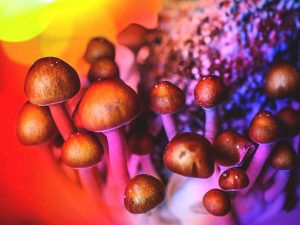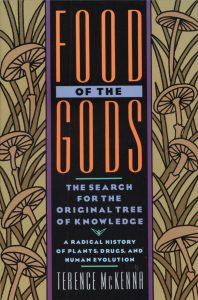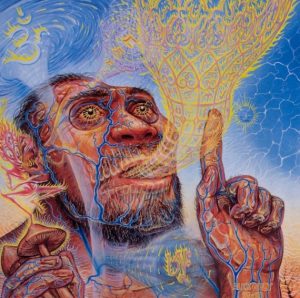Psilocybin and Marijuana: A Comparison
Marijuana users have discussed the reasons they initially partook in the act of using marijuana but most of it boils down to experimentation. Put simply these people wanted to see how life feels under the influence of psychoactive chemicals. Although most people who use marijuana regularly would not consider it one, marijuana is actually a hallucinogen.

https://www.healthline.com/health-news/benefits-of-medical-mushrooms
In fact, one of the most common associations with the intake of the drug is “the munchies” which is not the THC making you hungry but in fact, the THC making you think you are hungry. It’s all a trick on the mind which is why you can still get “the munchies” after eating a full course meal if marijuana is taken after eating.
However, most people who use it would not say that it really gives them hallucinations as they are still able to perform most tasks without anything looking strange or different. One drug that is associated with marijuana that actually causes hallucinations is the ever-present psilocybin mushroom or more commonly known as “magic mushrooms” or “shrooms”. These actually cause real hallucinations and can also change patterns of thinking and alterations of consciousness. While these experiences are generally considered positive among its users in terms of learning more about oneself; there may be more than meets the eye to opening up the doors of perception.
Psilocybin: The Stoned Ape Theory

https://www.amazon.com/Food-Gods-Original-Knowledge-Evolution/dp/0553371304
Enter Dennis and Terrence McKenna who are both legendary voices in the psychedelic community. In his book “Food of the Gods: The Search for the Original Tree of Knowledge: A Radical History of Plants, Drugs, and Human Evolution” Terrence outlines his idea that would come to be known as the “Stoned Ape Theory”. This “theory” came from a conversation between the McKenna’s, the idea is that psilocybin mushrooms played an important role in our evolution from our primate ancestors.
This might sound a little ridiculous at first but scientists have been speculating how the human brain grew and developed. McKenna is essentially saying that our ancestors might have accidentally taken psilocybin mushrooms and the effects of the drugs caused gradual change over millions of years leading to an expansion of consciousness and eventually creating human beings.
This idea was explored more on the Joe Rogan Experience when acclaimed mycologist Paul Stamets explained to Rogan about fungal consciousness but more importantly the neurobiology behind the “Stoned Ape Theory”. The way this “theory” or more accurately hypothesis works scientifically is the fact that psilocybin mushrooms affect serotonin uptake while decreasing fear responses and increasing empathy. These are traits of leadership in human culture, so apes that would take these mushrooms would end up becoming pack leaders. Over millions of years of ingestion, these mushrooms would end up expanding brain size while developing and expanding consciousness into the place we are now.

If this hypothesis could be proven true it would bring up a lot of questions for us. What does it mean to be human? Can we evolve further through the use of psychedelics? If it was achievable for apes to evolve into humans what would happen with other animals? While these questions are incredibly scientifically and philosophically engaging in reality they are questions we will probably never be able to answer in a timely manner or even at all. What might be more important is what people think of this theory, both people who have taken psilocybin mushrooms and those who have not. That is why I have created a survey asking people their thoughts.
A Psilocybin Survey
The questions are simple. All I asked is if they have heard of the theory, whether or not they have taken psilocybin mushrooms and what they think of the theory. This is what I got.
In a survey of 16 people, half of the responders knew about the McKenna brothers theory. Surprisingly this does not match the number of people who have reported taking psilocybin mushrooms with the majority leading in the “have taken” camp. This is probably because older groups of people are more likely to have taken mushrooms before due to them not being illegal until 1968 allowing an older generation to be more acquainted with them. These older groups of people are also less likely to watch Joe Rogan, where the theory was given more social publicity.
Psilocybin Agreement: Inwards
Now for the real question? What do psilocybin mushroom users think of this idea? A lot of them agreed with this! Five out of the nine people who reported taking mushrooms had some positive remarks regarding this theory. Some of them related the idea directly to their tripping
One responder wrote: “After taking mushrooms I’ve definitely been able to look at the world around me, and even the thoughts inside of me into a whole new perspective. I now question more logic, ideas, intentions, & purposes/meanings. This has sparked a time of enlightenment, a spiritual awakening that I didn’t expect to come of it. It’s like taking an ape, giving him mushrooms, then him realizing the significance of his opposable thumbs. You start to realize particular things that you may not have been able to think about. Like thinking beyond your own thoughts, beyond your own mind. So, like the McKenna brothers said, developing your consciousness.”
This self-reflective state of experiences and life shows a very strong aspect in the culture of people who take mushrooms. This idea of being able to look inwards and take oneself on a path of self-discovery is very similar to the reasons people take marijuana except on a much larger and more grandiose scale. I think recency plays a role here as a more recent experience increases feelings of openness allowing theories like the McKenna brothers to be more applicable from a self-discovery perspective.
Psilocybin Agreement: Outwards
There were also some more scientifically driven agreements among the psilocybin community. Another responder wrote: “I can see how this theory might have some credence. It’s plausible that not only did a hallucinogenic experience provide insight into not only our conditions but may have provided glimpses at potential solutions to problems, leading to an evolution of consciousness. Also, there is evidenced that psilocybin leads to synaptic growth and increases in neuroplasticity. All of this seems to point in the direction of a link, possibly the missing link, to our growth from primates.”
This response feels much more of an outward response to a past experience rather than an inward response to a recent one. As time keeps moving forward we keep discovering more about mushrooms. For example, the company Compass Pathways has been working with psilocybin therapy to help people deal with anxiety, depression, and other mental illnesses. And if limiting these negative responses to the human condition is a positive development, who’s to say that eliminating these problems isn’t a step forward in the evolutionary process.
Psilocybin: A Tad Far Fetched for a Theory of Evolution
While most of these responses agreed with this theory four out of nine of them did not. This mostly comes from the idea that there isn’t enough information to quite set this theory in stone. A psilocybin user responded with: “Mushrooms give you a heightened state of awareness. I can understand where the idea of stoned ape comes from, but I won’t say I believe in it unless there is research done on the Long term effects of mushroom ingestion on the development of neural pathways.”
This is 100% true as this theory has not and mostly cannot be tested. While it would be interesting to find out, the idea of steadily giving animals mushrooms for two million years is not rational nor is it ethical. There might be some studies we could do but nothing would ever be able to prove this theory without fully replicating it which stated previously is not a good idea
Non-Psilocybin Users: A Non-Tripper’s Perspective
As for people who have not done psilocybin mushrooms, their responses were all fairly against it. A non-user replied: “My first impression is that I don’t believe the theory. Mainly due to the fact that animals like chimpanzees and elephants have been shown to have developed consciousness and there is little to prove that these animals evolved consciousness through ingested psilocybin mushrooms. Though I know little about psilocybin mushrooms, I would believe it’s wholly impossible for elephants to consume them due to geography and eating habits. Thus, I believe there must be another way in which animals evolve consciousness and thus I’d believe that it’s much more likely that humans and their closest genetic relatives have evolved consciousness through that method as opposed to some accidental ingestion of mushrooms.”

https://www.samwoolfe.com/2013/05/terence-mckennas-stoned-ape-theory.html
This is a very logical and rational way of thinking about this. A lot of McKenna’s theory lies within happenstance. It relies on things happening in a way that just happens to cause the desired outcome. From a logical chain of events perspective, this very scientific analysis makes clean-cut sense. However, this is not to dismiss the experience of people who have taken mushrooms as I think the unique personal experience is ultimately the most important part of a psychedelic experience.
A Psilocybin Conclusion: Self Discovery
Ultimately the world of psilocybin mushrooms brings a unique and different experience to everyone that takes them, ape or human. And the ideas of self-discovery and personal experiences give one something to think about the next time they use marijuana. You never know what you might discover about yourself.






